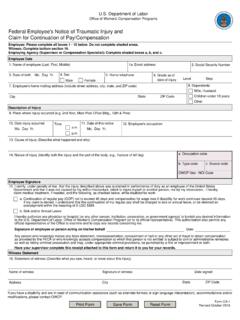Transcription of Work Injury Compensation Claim Frequently Asked …
1 work Injury Compensation Claim Frequently Asked Questions (FAQs) Changes to WICA (effective 1 June 2012) General Coverage Compensation Benefits Insurance Requirement Accident Reporting Requirement Claim Application Changes to WICA (effective 1 June 2012) Updating of WICA Compensation Limits 1) What is the increase in Compensation limits? When will an injured employee be entitled to the new Compensation limits? The new Compensation limits are applicable to accidents that occurred on and after 1 Jun 2012. The existing Compensation limits would continue to apply to all accidents that occurred before 1 Jun 2012. The revisions in Compensation limits are as follows: Limits Current Limit (accidents happened before 1 Jun 2012) Adjusted Limit (accidents happened on and after 1 Jun 2012) Death Minimum $47,000 $57,000 Maximum $140,000 $170,000 Permanent Incapacity Minimum $60,000 x %PI $73,000 x %PI Maximum $180,000 x %PI $218,000 x %PI Medical Expenses Up to $25,000 or 1 year from date of accident, whichever is reached first Up to $30,000 or 1 year from date of accident, whichever is reached first 2) Why is there a need to set absolute limits for the cost of medical treatment?
2 As WICA seeks to strike a fair balance between Compensation for employees and the obligations placed on employers and their insurers, MOM has to set a clear limit to the Compensation for medical expenses in order to provide certainty to employers. The new limits for medical expenses will continue to fully cover more than 95% of claims where hospitalisation is required. The one-year cap is adequate as most injuries typically stabilise within a year from the accident. Employees who wish to Claim the full medical expenses beyond the cap can choose to do so under common law. Needy cases can also apply through the hospital s medical social worker for assistance on a case-by-case basis. work -related Fights 3) Why is MOM disallowing Compensation for employees injured in work -related fights, particularly if the fight arose over a dispute over work -related matters?
3 Given that WICA is a no-fault system, we need to ensure that the burden of Compensation placed on employers is not an unreasonable one. While work -related disputes between co-workers may arise from time to time, they should not resort to fights to resolve them, and employers should not have to bear the cost of Injury . With the amendment, employees injured in work -related fights will still be eligible for Compensation , provided these injuries were sustained (i) in the act of self-defence, (ii) while defending another individual, (iii) while acting under the employer s/principal s instructions or consent to break up the fight, safeguard lives or property, or maintain law and order or (iv) as a result of an assault to which he did not retaliate. Only employees who deliberately participate in fights at the workplace whether due to a dispute over work -related matters or not and sustain injuries in the process are not eligible for work Injury Compensation .
4 4) How would MOM determine if an employee injured in a fight is eligible for work Injury Compensation ? As with all work Injury claims, MOM will examine the facts of the case to determine the admissibility of a Claim . Compensation for Diseases arising from prolonged exposures to work -related hazards 5) MOM is proposing to allow Compensation claims for diseases resulting from prolonged exposures to work -related hazards and specifically cites chemical and biological agents. Would physical agents be considered work -related hazards and hence compensable? Diseases arising from prolonged exposures to physical agents at work , such as radiation, noise and compressed air are well-established and already listed under the Second Schedule of WICA as compensable occupational diseases. To update the list, MOM is proposing to include diseases caused by excessive heat as a new occupational disease under the Second Schedule.
5 6) Will the amendment to compensate for diseases resulting from work -related exposure to biological or chemical agents potentially expose employers to claims which may not have a clear link to work ? MOM will only admit claims where the link to work can be proven. For claims involving diseases arising from prolonged exposure to work -related hazards, it must be proven that the exposure arose out of and in the course of employment. Claims without this link to work would therefore not be admitted. If employers are unclear as to whether a disease is work -related and hence eligible for work Injury Compensation , they are advised to notify MOM about the disease through iReport. MOM will examine the facts of the case to determine the admissibility of a Claim .
6 7) Would notifying MOM of a possible work -related disease constitute admission of the Claim ? No, notifying MOM of a possible work -related disease would not constitute admission of the Claim . The Claim would be admitted only after MOM has conducted its investigation and concluded that the disease is work -related. Occupational Diseases Specific Amendments to Second Schedule of WICA 8) Why is MOM introducing a new occupational disease of Diseases caused by excessive heat ? Currently, claims for injuries arising from exposure to excessive heat at work , heat stroke, are already admissible under WICA. The amendment to the Second Schedule provides greater clarity that such injuries are compensable as an occupational disease. 9) Why is MOM deleting two ODs, SARS and Avian Influenza, from the Second Schedule?
7 The Second Schedule lists occupational diseases that have a clear and well-established link to risk factors at work . Infectious diseases such as SARS and avian influenza can be readily contracted via community spread. Their link to work is not so clear, unlike the other diseases listed on the Second Schedule. However, should an employee contract SARS or avian flu arising from exposure at work , the amendment to allow Compensation for diseases contracted as a result of prolonged exposures to work -related hazards ( biological and chemical agents) will still allow him to receive work Injury Compensation . 10) What recourse does an employee have if he is diagnosed with an occupational disease within the time limit but the employer/insurer is no longer operating?
8 If the employer or insurer is no longer in operation and the employee is in financial hardship, he may approach MOM for assistance to apply for financial aid from the Workers Fund. 11) What happens if an employee who is exposed to a disease-causing agent is subsequently transferred to a job within the same company with no such exposure? The employer will still be liable for Compensation if the employee was diagnosed with the disease within one year from his last exposure to the disease-causing agent. 12) For an employee who contracted an occupational disease which was diagnosed after the time limits specified in the Second Schedule of WICA, what recourse does he have in obtaining Compensation ? The injured employee has the option to seek damages against his employer under common law.
9 To do so, he would be required to prove that the negligence of his employer contributed to his Injury . In cases of financial hardship, the employee may approach MOM for assistance to apply for financial aid from the Workers Fund Time Bar for reversion to WICA from Common Law 13) What recourse does an employee have if he commences a common law suit and realises that he is unlikely to succeed in his common law Claim ? Under WICA, injured employees have one year from the date of the accident to decide whether to pursue their Claim under WICA or under common law. Employees may choose to revert to WICA even after filing a Claim under common law, as long as this is done within one year of the accident. Beyond that, if the common law suit was initiated within one year of the accident, and the accident is assessed to be compensable under WICA, the employee can request that the court assess the WICA Compensation due the employee, minus costs, and direct the employer to pay Compensation .
10 Insurance Clarifying the Liability of the Employer s Insurance Policy 14) How would the amendment to make the employer s insurance policy responsible for claims when there are multiple insurance policies impact industries where the prevailing practice is to rely on the project insurance policy and not the employer s? Under WICA, employers are liable to compensate their employees for any Injury they sustain out of and in the course of employment. This amendment is intended to align the provision of work Injury Compensation insurance with this principle. Employers should ensure that their insurance policies provide sufficient coverage for all their workers and liabilities under WICA, rather than relying on the project insurance policy. However, to take into account industry practice where the principal s insurance policy compensates workers injured at the project site, a third party s insurance policy may be used to compensate the injured worker.



